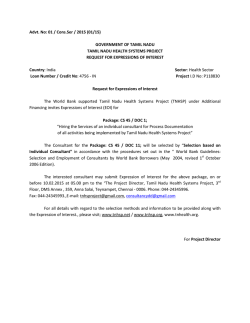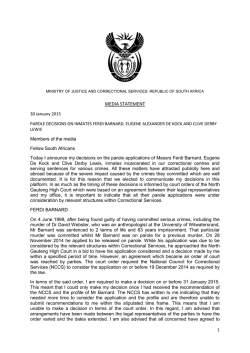
Presentation - House Appropriations Committee
Department of Corrections House Appropriations Committee January 28, 2015 Harold W. Clarke, Director Personnel Impacts October 2014 Budget Reductions and Salary Compression 2 Personnel Impact October 2014 Budget Reductions • 4 Facilities were impacted: – – – – Powhatan Correctional Center (Main) Cold Springs Work Center White Post Diversion Center Culpeper Correctional Center for Women • 641 positions were abolished. • 129 staff were initially laid off (as of 12/5/14). • 130 staff accepted Waivers (enhanced retirements and severance). 3 Personnel Impact October 2014 Budget Reductions • The Department was much more successful in placing employees than originally anticipated. – DOC made a purposeful effort to slow down hiring prior to the closing announcement. – DOC stopped hiring almost entirely when the closing announcement was made. 4 Compensation for Correctional Officers • Salary is an issue for the recruitment and retention of DOC Correctional Officers. • Correctional Officer starting salary = $28,035. • Many Correctional Officers maintain a second job and some seek supplemental assistance (food stamps) to support their families. • Salary Compression is an issue. • Only $3,000 separates the 25th and 75th percentiles of DOC Corrections Officers’ salaries. 5 Benefits of More Competitive Correctional Officer Salaries • Enhances recruitment and retention. • Decreases turnover resulting in a more knowledgeable, seasoned workforce. • DOC will be equipped with a committed, skilled workforce that will continue to positively impact effective offender re-entry and improve long-term public safety. 6 Offender Health Care Providing Offender Health Care is constitutionally mandated. 7 Fiscal year 2014 Healthcare Expenditures ($150.6M) Personal Services $26,697,450 Off-site heathcare for DOC managed sites $25,869,084 Medications (other than HIV) $7,261,146 Other medical contracts (physicians, psychiatrists, dentists, optometrists, nurses & others service providers) $5,851,389 HIV medications/labs $4,648,489 Dialysis $1,717,781 Comprehensive Health Services contract (includes staffing, medications, offsite care, supplies & equipment) $76,925,247 Medical supplies & equipment $1,591,168 8 Offender Health Care Costs • Virginia costs compare favorably with other Corrections Systems. – Virginia ranked 21st lowest in cost per offender among 50 states (July 2014 report from the Pew Charitable Trusts and MacArthur Foundation on State Prison Health Care Spending). – In a 2010 American Correctional Association survey Virginia ranked 22nd lowest in cost per offender (with 39 states reporting). 9 Offender Health Care Costs • DOC offender health care costs compare favorably with the Dept. of Human Resource Management Commonwealth Premiums for state employees. – FY2013 offender medical per capita cost = $5,463 – FY2013 Commonwealth of Virginia single employee health insurance premium cost = $6,492 10 Governor’s Authorized Funding • The Governor’s Introduced Budget provides DOC with increased medical funding as follows: – FY2015 = $10.9M General Fund – FY2016 = $20.4M General Fund • The DOC projects funding provided in FY2015 is adequate. However, the Department projects a need for an additional $2.6M in FY2016 primarily driven by the cost for the new Hepatitis C treatment regimen that DOC is legally mandated to provide. 11 Health Care Funding Concerns • Providing the required community standard of care mitigates the potential for increased medical malpractice allegations and civil litigation for the Commonwealth. • If DOC had to absorb the projected $2.6M driven by increased Hepatitis C costs, it would increase the vacancy rate the Department already is required to maintain. Increased vacancy rates: – Negatively impact security operations. – Adversely impact the Department’s ability to fully accomplish its mission. 12 Hepatitis C Treatment • A new treatment regimen has been developed which is very successful in the treatment of Hepatitis C. • This new regimen has become the community and correctional standard of care that DOC is legally mandated to provide. • The DOC Medical Department has identified more than 50 offenders who could benefit from the new Hepatitis C treatment regimen. • The cost to provide the new treatment regimen: – To treat 50 offenders per year = $3,350,000 – Funding provided for Hep-C treatment = $750,000 – Additional funding required = $2,600,000 13 Overview of Health Care Procurement Process 6 Vendors have responded to Health Care RFP. Remaining Procurement Timeline: – January 2015 – Committee evaluates proposal, submits points of clarification, checks references. – February through July 2015 – The Department will be in negotiations with the vendors. – August through September 2015 – Transition stage. – October 2015 – Implementation of new contract. 14 Overview of Health Care Procurement Process New requirements include: – DOC has inpatient hospital and inpatient physician cost responsibility. This change was made to ensure Medicaid cost avoidances will benefit the Commonwealth. – Liquidated damages are assessed to the contractor if the contractor does not provide the DOC with an annual independent audited AICPA (American Institute of Certified Public Accounts) financial statement of Virginia contract operations. – Liquidated damages for non-compliance with DOC healthcare procedures, and guidelines. 15 VADOC Medicaid - 2015 • VADOC identifies current Medicaid eligible offenders who are 65+ years of age, disabled, or pregnant upon intake into the VADOC system. • DMAS terminates enrollment of Medicaid recipients who are 65+ years of age or disabled upon incarceration. – DOC requests that DMAS continue Medicaid eligibility of offenders 65+ years of age or disabled upon intake into Corrections. • DMAS has proposed hiring an eligibility worker to process new VADOC offender Medicaid applications. 16 Bed Impacts Due to October 2014 Facility Closings 17 DOC – Institutional Bed Impacts • Due to October closings, a total of 959 Institutional beds were eliminated: – 809* at Powhatan Correctional Center – 150 at Cold Springs Work Center • To facilitate the closings and housing of displaced offenders DOC added Institutional beds: – 128 beds at Nottoway Correctional Center • June 2014 capacity = 1,200 (151% of design capacity) • New bed capacity = 1,328 (173% of design capacity) – 200 beds at Augusta Correctional Center • June 2014 capacity = 1,163 (145% of design capacity) • New bed capacity = 1,363 (177% of design capacity) *Capacity reflects Powhatan Main only; excludes mental health and medical beds (total of 867) 18 DOC – Institutional Bed Impacts – 109 beds at Buckingham Correctional Center • June 2014 capacity = 1,084 (166% of design capacity) • New bed capacity = 1,193 (186% of design capacity) – 180 beds at Marion Correctional Treatment Center came on line in December 2014. – 200 beds will be added at Keen Mountain Correctional Center • Renovating a Correctional Enterprise area into a dormitory • Expected to be available June 2015 19 DOC - Diversion Center (Community Corrections Beds) • 128 Community Corrections beds were eliminated with the closing of White Post Diversion Center. • In order to help offset the bed loss, DOC added: — 42 beds at Harrisonburg Diversion Center — 12 beds at Stafford Diversion Center • The DOC lost a total of 74 Community Corrections beds. 20 DOC – Institutional Bed Impacts Since 2008 • Since 2008 the DOC has closed 10 facilities resulting in the removal of 4,624 beds due to budget shortfalls. • Since 2008 DOC has built 4 new prisons (plus expanded capacity at Marion Correctional Treatment Center) resulting in the addition of 4,048 beds. • Facilities Design Capacity = 24,572 • Facility Current Capacity = 30,242 • Facility Capacity is 123% of Design Capacity 21 DOC – State Responsible Out of Compliance Impact August 25, 2014 – January 5, 2015 5,800 5,726 5,600 5,523 5,400 5,200 5,000 4,985 • • Since August 25, 2014, out of compliance has increased by 11% Since peaking on November 3, 2014, out of compliance has decreased by 3.5% Information compiled by VADOC Statistical Analysis on January 5, 2015 from weekly out of compliance figures provided by VADOC Offender Management Services 5-Jan-15 29-Dec-14 22-Dec-14 15-Dec-14 8-Dec-14 1-Dec-14 24-Nov-14 17-Nov-14 10-Nov-14 3-Nov-14 27-Oct-14 20-Oct-14 13-Oct-14 6-Oct-14 29-Sep-14 22-Sep-14 15-Sep-14 8-Sep-14 1-Sep-14 4,600 25-Aug-14 4,800 22 Issues Considered When Removing Offenders From Jails Ongoing contact between DOC staff and each jail, along with monthly discussions with the Compensation Board help guide decisions on jail relief. Issues considered include: • • • • • • • Available DOC bed space Cases that have been out of compliance the longest Specific cases of medical/mental health/behavioral problems identified by the jails Jails with significant overcrowding issues Cases with program requirements (Therapeutic Community/Behavior Corrections Programs) Cases with detainer issues Cases of sexually violent predator pending evaluation 23 Impact of Other Budget Cuts • DOC’s annual budget (not counting diminished resources for Education) continues to begin each fiscal year with a shortfall of approx. $32M (equivalent to approximately 600 Correctional Officer positions). – The shortfall is driven by underfunding in information technology, utilities, gasoline, P&P District office leases, and insurances. – The cost of underfunded leases and information technology is addressed by requiring a current vacancy rate of 3.3%. – In addition to this vacancy rate, individual facilities must generate additional vacancies to absorb underfunded costs for utilities and gasoline. • While the vacancy rate to meet the shortfall is applied against all functions (excluding medical), Security positions are most adversely impacted because they comprise the majority of DOC’s workforce and account for a majority of the turnover which occurs. 24
© Copyright 2026






